Professional Ethics: Comparative Analysis of Ethical Theories
VerifiedAdded on 2023/06/09
|9
|2055
|462
Essay
AI Summary
This essay provides a comprehensive exploration of professional ethics through the lens of prominent philosophers such as Socrates, Kant, Mill, Aristotle, and Hobbes. It begins by examining Socrates' philosophical method and his opposition to the Sophists, highlighting his belief in constant truth and moral values. The essay then contrasts Kant's Categorical Imperative with Mill's Utilitarianism, using the moral dilemma of hiding a Jewish family from Nazi soldiers to illustrate their differing approaches. Furthermore, Aristotle's view on human nature and virtue ethics is discussed, emphasizing the role of habits and choices in shaping moral character. Finally, the essay delves into the political philosophies of Hobbes, Locke, and Emma Goldman, comparing their perspectives on government, individual rights, and social hierarchies. The essay concludes by arguing that Aristotle's view is more universal and logical compared to the other five views.
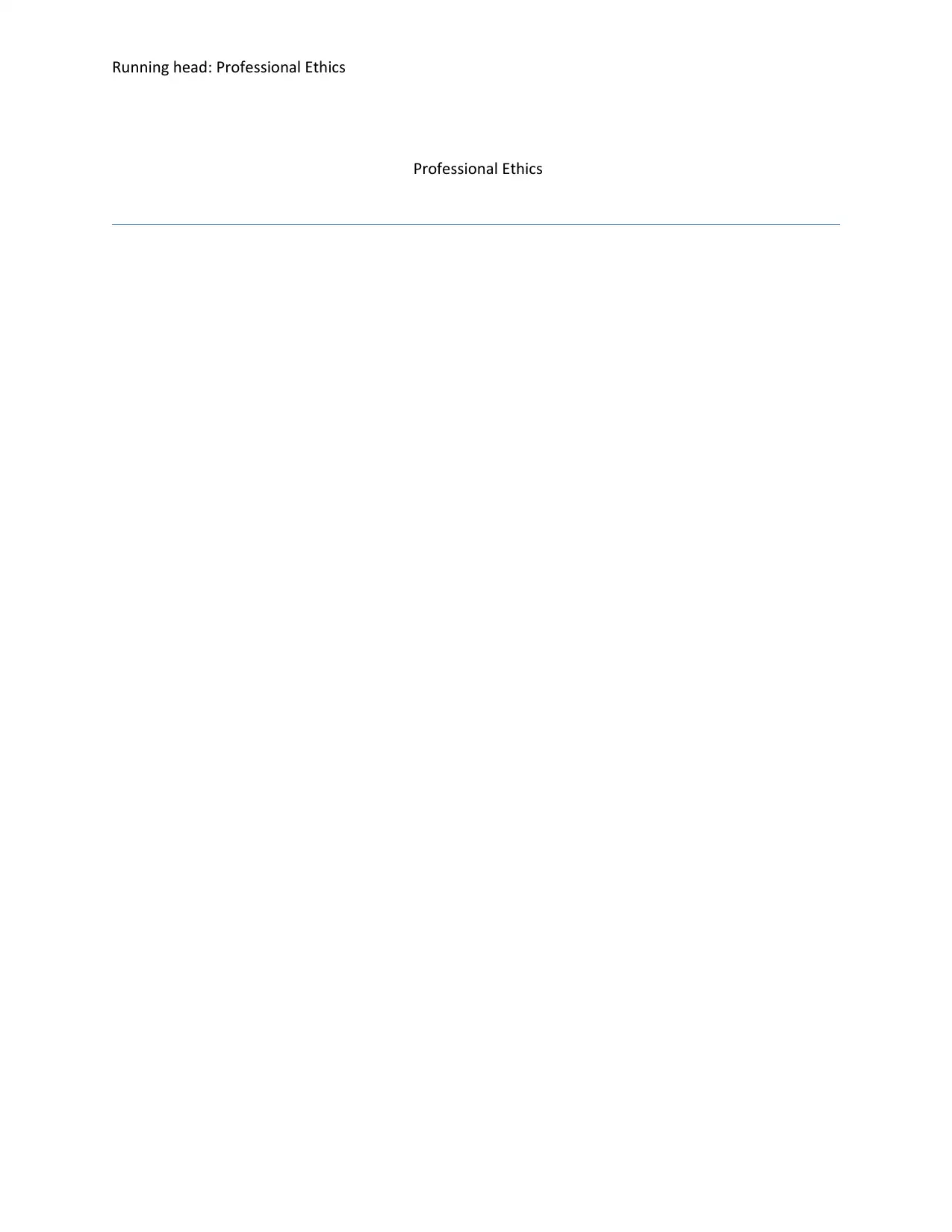
Running head: Professional Ethics
Professional Ethics
Professional Ethics
Paraphrase This Document
Need a fresh take? Get an instant paraphrase of this document with our AI Paraphraser
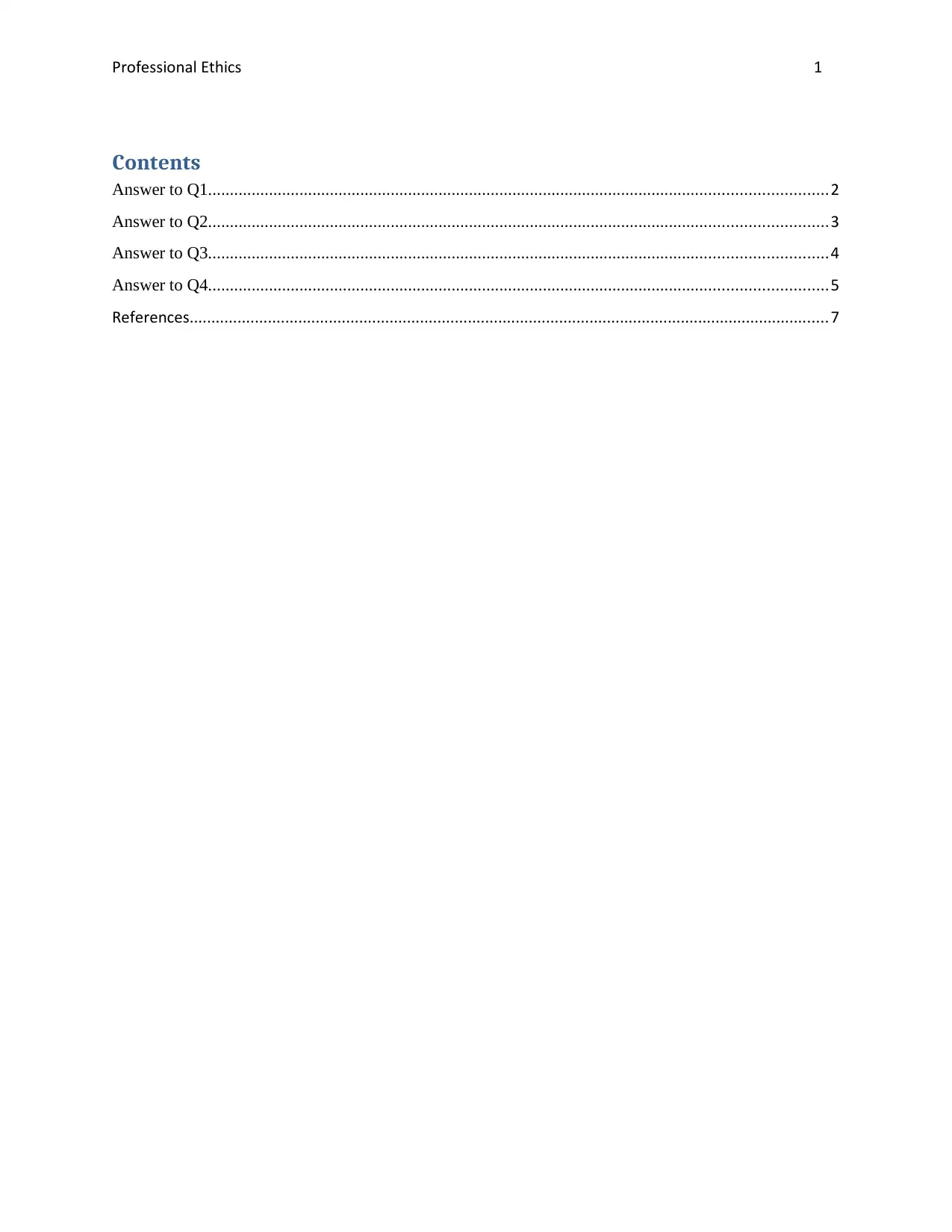
Professional Ethics 1
Contents
Answer to Q1..............................................................................................................................................2
Answer to Q2..............................................................................................................................................3
Answer to Q3..............................................................................................................................................4
Answer to Q4..............................................................................................................................................5
References...................................................................................................................................................7
Contents
Answer to Q1..............................................................................................................................................2
Answer to Q2..............................................................................................................................................3
Answer to Q3..............................................................................................................................................4
Answer to Q4..............................................................................................................................................5
References...................................................................................................................................................7
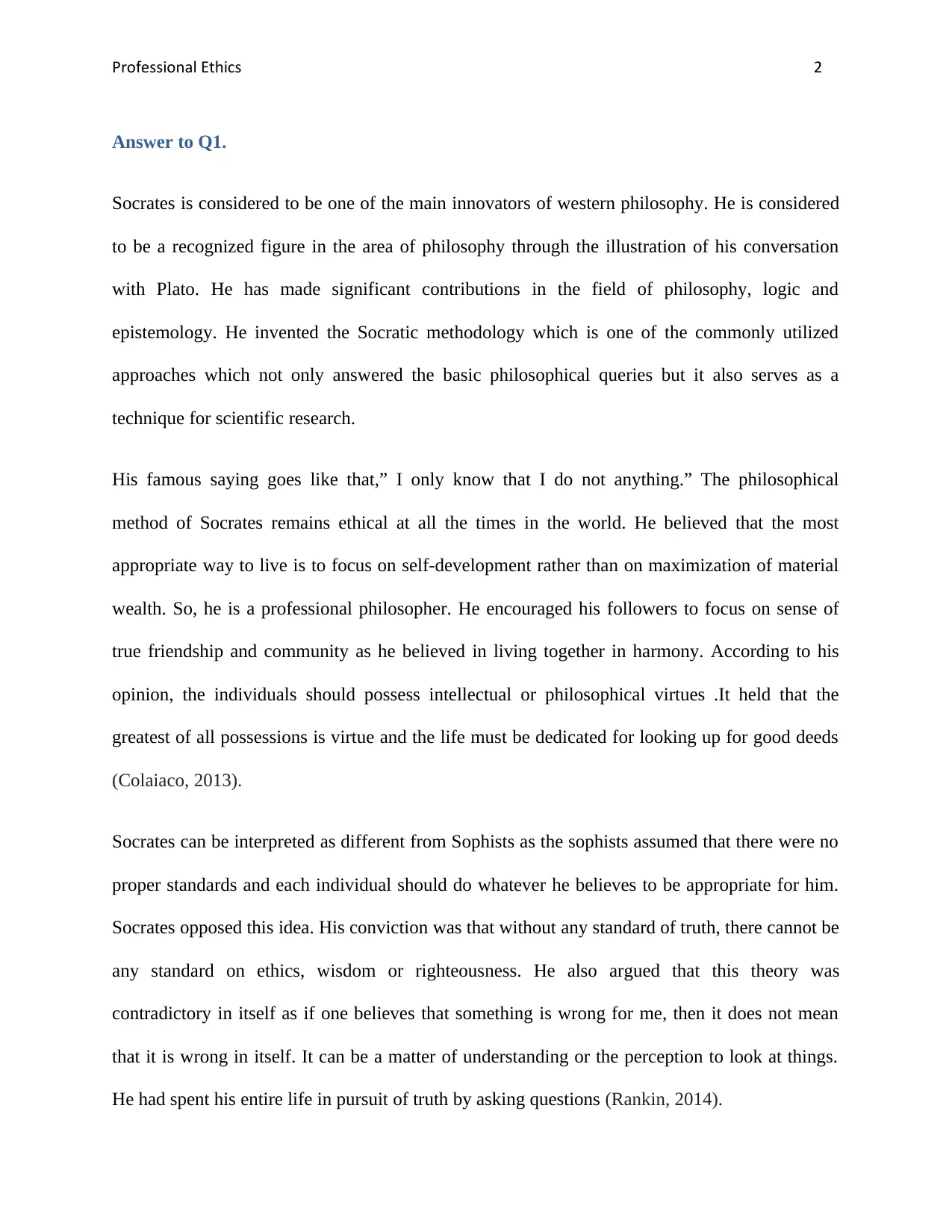
Professional Ethics 2
Answer to Q1.
Socrates is considered to be one of the main innovators of western philosophy. He is considered
to be a recognized figure in the area of philosophy through the illustration of his conversation
with Plato. He has made significant contributions in the field of philosophy, logic and
epistemology. He invented the Socratic methodology which is one of the commonly utilized
approaches which not only answered the basic philosophical queries but it also serves as a
technique for scientific research.
His famous saying goes like that,” I only know that I do not anything.” The philosophical
method of Socrates remains ethical at all the times in the world. He believed that the most
appropriate way to live is to focus on self-development rather than on maximization of material
wealth. So, he is a professional philosopher. He encouraged his followers to focus on sense of
true friendship and community as he believed in living together in harmony. According to his
opinion, the individuals should possess intellectual or philosophical virtues .It held that the
greatest of all possessions is virtue and the life must be dedicated for looking up for good deeds
(Colaiaco, 2013).
Socrates can be interpreted as different from Sophists as the sophists assumed that there were no
proper standards and each individual should do whatever he believes to be appropriate for him.
Socrates opposed this idea. His conviction was that without any standard of truth, there cannot be
any standard on ethics, wisdom or righteousness. He also argued that this theory was
contradictory in itself as if one believes that something is wrong for me, then it does not mean
that it is wrong in itself. It can be a matter of understanding or the perception to look at things.
He had spent his entire life in pursuit of truth by asking questions (Rankin, 2014).
Answer to Q1.
Socrates is considered to be one of the main innovators of western philosophy. He is considered
to be a recognized figure in the area of philosophy through the illustration of his conversation
with Plato. He has made significant contributions in the field of philosophy, logic and
epistemology. He invented the Socratic methodology which is one of the commonly utilized
approaches which not only answered the basic philosophical queries but it also serves as a
technique for scientific research.
His famous saying goes like that,” I only know that I do not anything.” The philosophical
method of Socrates remains ethical at all the times in the world. He believed that the most
appropriate way to live is to focus on self-development rather than on maximization of material
wealth. So, he is a professional philosopher. He encouraged his followers to focus on sense of
true friendship and community as he believed in living together in harmony. According to his
opinion, the individuals should possess intellectual or philosophical virtues .It held that the
greatest of all possessions is virtue and the life must be dedicated for looking up for good deeds
(Colaiaco, 2013).
Socrates can be interpreted as different from Sophists as the sophists assumed that there were no
proper standards and each individual should do whatever he believes to be appropriate for him.
Socrates opposed this idea. His conviction was that without any standard of truth, there cannot be
any standard on ethics, wisdom or righteousness. He also argued that this theory was
contradictory in itself as if one believes that something is wrong for me, then it does not mean
that it is wrong in itself. It can be a matter of understanding or the perception to look at things.
He had spent his entire life in pursuit of truth by asking questions (Rankin, 2014).
⊘ This is a preview!⊘
Do you want full access?
Subscribe today to unlock all pages.

Trusted by 1+ million students worldwide
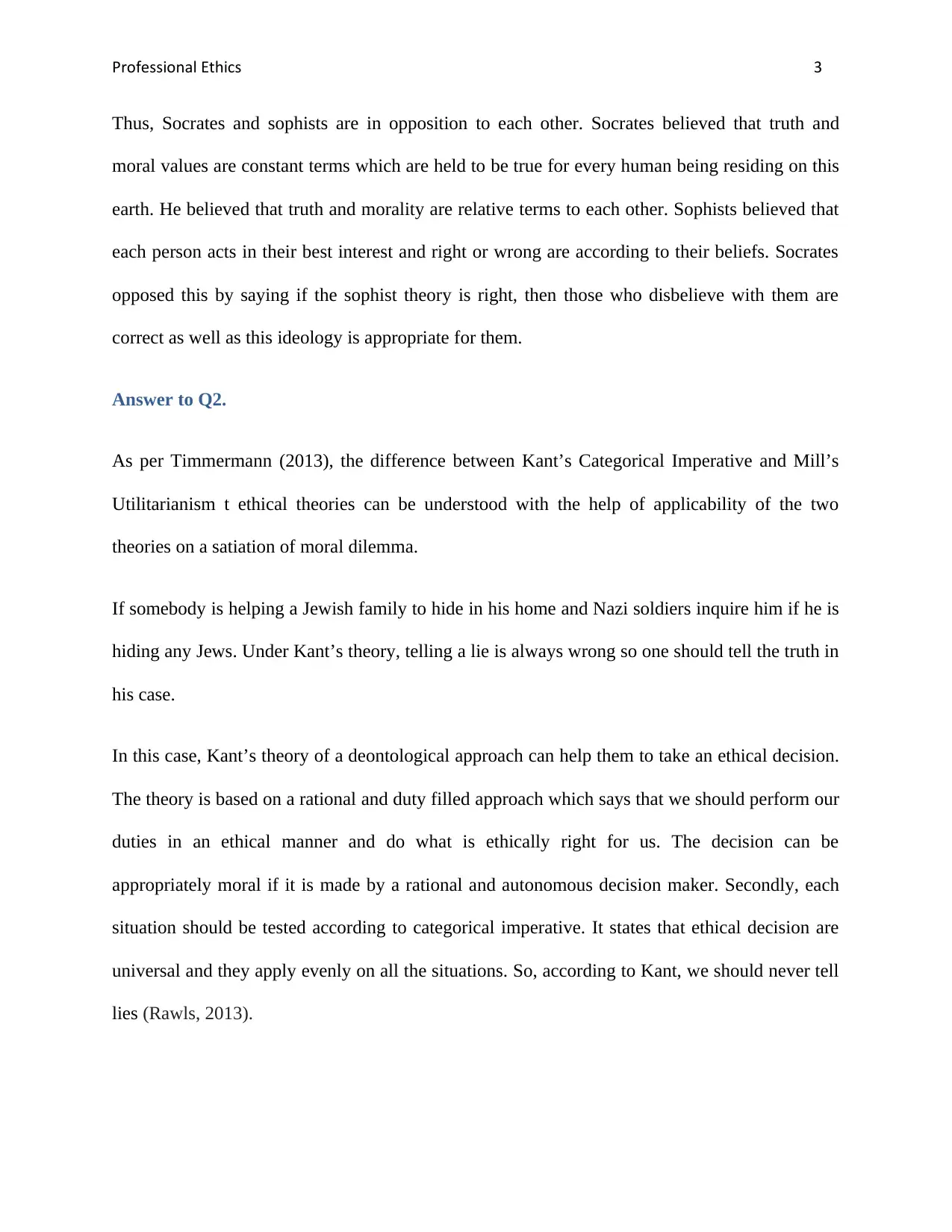
Professional Ethics 3
Thus, Socrates and sophists are in opposition to each other. Socrates believed that truth and
moral values are constant terms which are held to be true for every human being residing on this
earth. He believed that truth and morality are relative terms to each other. Sophists believed that
each person acts in their best interest and right or wrong are according to their beliefs. Socrates
opposed this by saying if the sophist theory is right, then those who disbelieve with them are
correct as well as this ideology is appropriate for them.
Answer to Q2.
As per Timmermann (2013), the difference between Kant’s Categorical Imperative and Mill’s
Utilitarianism t ethical theories can be understood with the help of applicability of the two
theories on a satiation of moral dilemma.
If somebody is helping a Jewish family to hide in his home and Nazi soldiers inquire him if he is
hiding any Jews. Under Kant’s theory, telling a lie is always wrong so one should tell the truth in
his case.
In this case, Kant’s theory of a deontological approach can help them to take an ethical decision.
The theory is based on a rational and duty filled approach which says that we should perform our
duties in an ethical manner and do what is ethically right for us. The decision can be
appropriately moral if it is made by a rational and autonomous decision maker. Secondly, each
situation should be tested according to categorical imperative. It states that ethical decision are
universal and they apply evenly on all the situations. So, according to Kant, we should never tell
lies (Rawls, 2013).
Thus, Socrates and sophists are in opposition to each other. Socrates believed that truth and
moral values are constant terms which are held to be true for every human being residing on this
earth. He believed that truth and morality are relative terms to each other. Sophists believed that
each person acts in their best interest and right or wrong are according to their beliefs. Socrates
opposed this by saying if the sophist theory is right, then those who disbelieve with them are
correct as well as this ideology is appropriate for them.
Answer to Q2.
As per Timmermann (2013), the difference between Kant’s Categorical Imperative and Mill’s
Utilitarianism t ethical theories can be understood with the help of applicability of the two
theories on a satiation of moral dilemma.
If somebody is helping a Jewish family to hide in his home and Nazi soldiers inquire him if he is
hiding any Jews. Under Kant’s theory, telling a lie is always wrong so one should tell the truth in
his case.
In this case, Kant’s theory of a deontological approach can help them to take an ethical decision.
The theory is based on a rational and duty filled approach which says that we should perform our
duties in an ethical manner and do what is ethically right for us. The decision can be
appropriately moral if it is made by a rational and autonomous decision maker. Secondly, each
situation should be tested according to categorical imperative. It states that ethical decision are
universal and they apply evenly on all the situations. So, according to Kant, we should never tell
lies (Rawls, 2013).
Paraphrase This Document
Need a fresh take? Get an instant paraphrase of this document with our AI Paraphraser
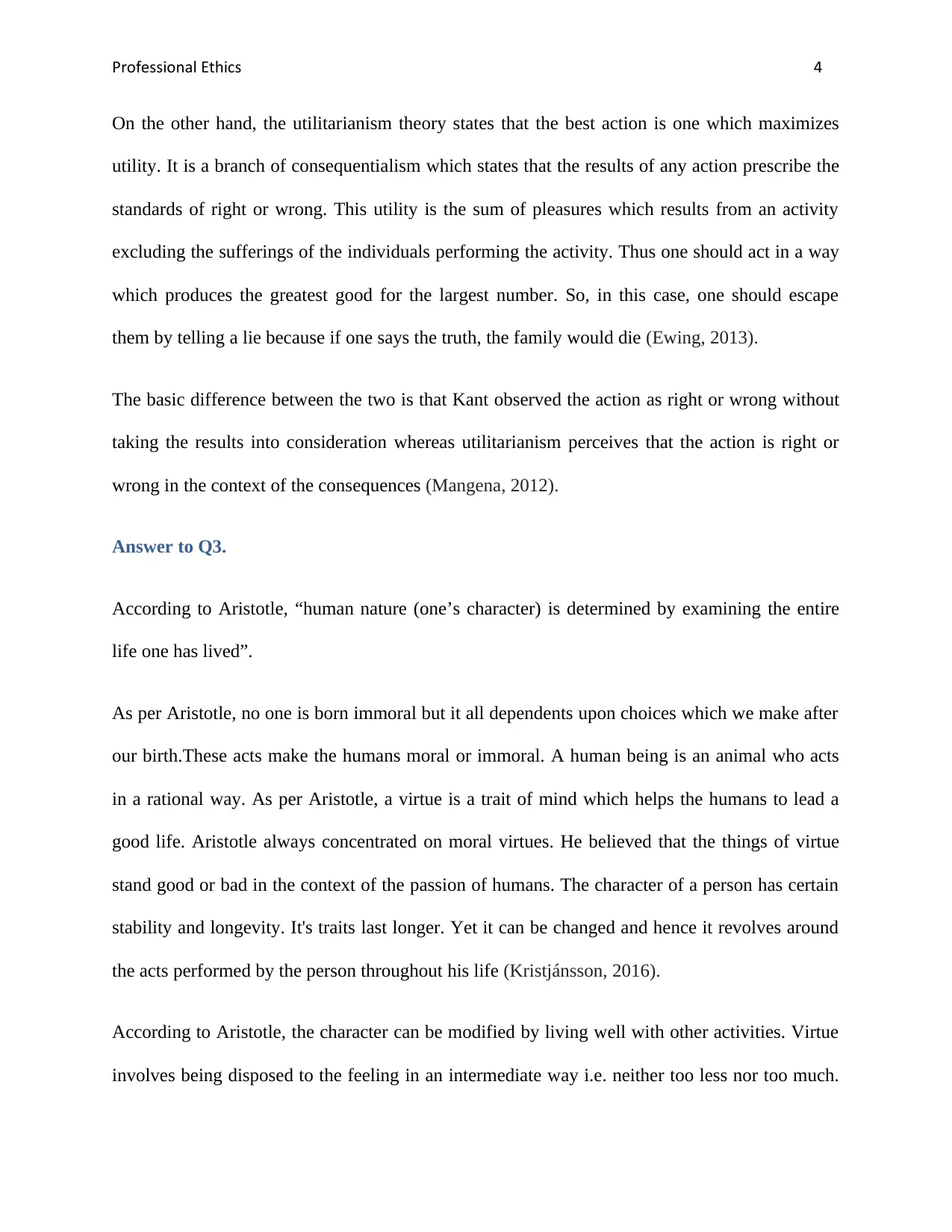
Professional Ethics 4
On the other hand, the utilitarianism theory states that the best action is one which maximizes
utility. It is a branch of consequentialism which states that the results of any action prescribe the
standards of right or wrong. This utility is the sum of pleasures which results from an activity
excluding the sufferings of the individuals performing the activity. Thus one should act in a way
which produces the greatest good for the largest number. So, in this case, one should escape
them by telling a lie because if one says the truth, the family would die (Ewing, 2013).
The basic difference between the two is that Kant observed the action as right or wrong without
taking the results into consideration whereas utilitarianism perceives that the action is right or
wrong in the context of the consequences (Mangena, 2012).
Answer to Q3.
According to Aristotle, “human nature (one’s character) is determined by examining the entire
life one has lived”.
As per Aristotle, no one is born immoral but it all dependents upon choices which we make after
our birth.These acts make the humans moral or immoral. A human being is an animal who acts
in a rational way. As per Aristotle, a virtue is a trait of mind which helps the humans to lead a
good life. Aristotle always concentrated on moral virtues. He believed that the things of virtue
stand good or bad in the context of the passion of humans. The character of a person has certain
stability and longevity. It's traits last longer. Yet it can be changed and hence it revolves around
the acts performed by the person throughout his life (Kristjánsson, 2016).
According to Aristotle, the character can be modified by living well with other activities. Virtue
involves being disposed to the feeling in an intermediate way i.e. neither too less nor too much.
On the other hand, the utilitarianism theory states that the best action is one which maximizes
utility. It is a branch of consequentialism which states that the results of any action prescribe the
standards of right or wrong. This utility is the sum of pleasures which results from an activity
excluding the sufferings of the individuals performing the activity. Thus one should act in a way
which produces the greatest good for the largest number. So, in this case, one should escape
them by telling a lie because if one says the truth, the family would die (Ewing, 2013).
The basic difference between the two is that Kant observed the action as right or wrong without
taking the results into consideration whereas utilitarianism perceives that the action is right or
wrong in the context of the consequences (Mangena, 2012).
Answer to Q3.
According to Aristotle, “human nature (one’s character) is determined by examining the entire
life one has lived”.
As per Aristotle, no one is born immoral but it all dependents upon choices which we make after
our birth.These acts make the humans moral or immoral. A human being is an animal who acts
in a rational way. As per Aristotle, a virtue is a trait of mind which helps the humans to lead a
good life. Aristotle always concentrated on moral virtues. He believed that the things of virtue
stand good or bad in the context of the passion of humans. The character of a person has certain
stability and longevity. It's traits last longer. Yet it can be changed and hence it revolves around
the acts performed by the person throughout his life (Kristjánsson, 2016).
According to Aristotle, the character can be modified by living well with other activities. Virtue
involves being disposed to the feeling in an intermediate way i.e. neither too less nor too much.
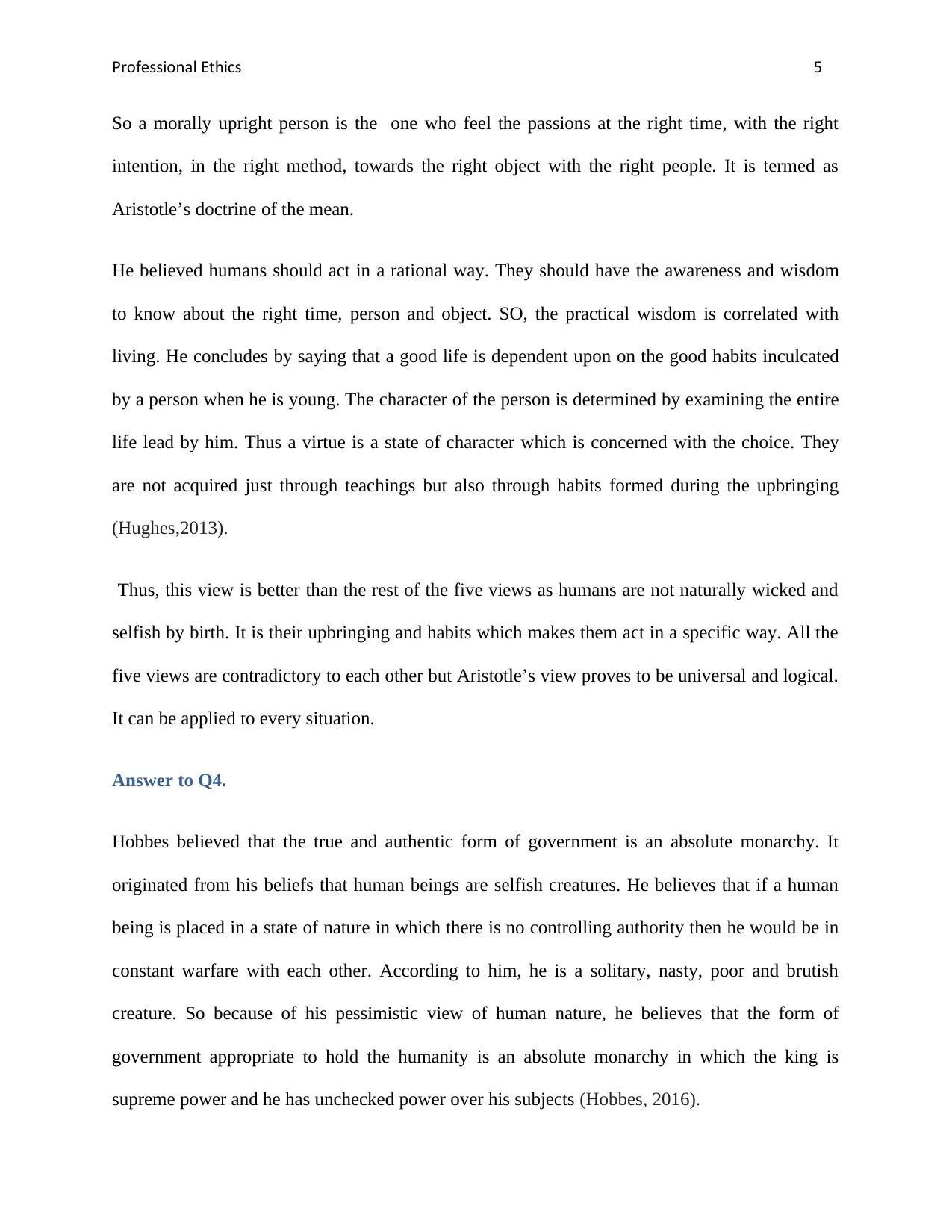
Professional Ethics 5
So a morally upright person is the one who feel the passions at the right time, with the right
intention, in the right method, towards the right object with the right people. It is termed as
Aristotle’s doctrine of the mean.
He believed humans should act in a rational way. They should have the awareness and wisdom
to know about the right time, person and object. SO, the practical wisdom is correlated with
living. He concludes by saying that a good life is dependent upon on the good habits inculcated
by a person when he is young. The character of the person is determined by examining the entire
life lead by him. Thus a virtue is a state of character which is concerned with the choice. They
are not acquired just through teachings but also through habits formed during the upbringing
(Hughes,2013).
Thus, this view is better than the rest of the five views as humans are not naturally wicked and
selfish by birth. It is their upbringing and habits which makes them act in a specific way. All the
five views are contradictory to each other but Aristotle’s view proves to be universal and logical.
It can be applied to every situation.
Answer to Q4.
Hobbes believed that the true and authentic form of government is an absolute monarchy. It
originated from his beliefs that human beings are selfish creatures. He believes that if a human
being is placed in a state of nature in which there is no controlling authority then he would be in
constant warfare with each other. According to him, he is a solitary, nasty, poor and brutish
creature. So because of his pessimistic view of human nature, he believes that the form of
government appropriate to hold the humanity is an absolute monarchy in which the king is
supreme power and he has unchecked power over his subjects (Hobbes, 2016).
So a morally upright person is the one who feel the passions at the right time, with the right
intention, in the right method, towards the right object with the right people. It is termed as
Aristotle’s doctrine of the mean.
He believed humans should act in a rational way. They should have the awareness and wisdom
to know about the right time, person and object. SO, the practical wisdom is correlated with
living. He concludes by saying that a good life is dependent upon on the good habits inculcated
by a person when he is young. The character of the person is determined by examining the entire
life lead by him. Thus a virtue is a state of character which is concerned with the choice. They
are not acquired just through teachings but also through habits formed during the upbringing
(Hughes,2013).
Thus, this view is better than the rest of the five views as humans are not naturally wicked and
selfish by birth. It is their upbringing and habits which makes them act in a specific way. All the
five views are contradictory to each other but Aristotle’s view proves to be universal and logical.
It can be applied to every situation.
Answer to Q4.
Hobbes believed that the true and authentic form of government is an absolute monarchy. It
originated from his beliefs that human beings are selfish creatures. He believes that if a human
being is placed in a state of nature in which there is no controlling authority then he would be in
constant warfare with each other. According to him, he is a solitary, nasty, poor and brutish
creature. So because of his pessimistic view of human nature, he believes that the form of
government appropriate to hold the humanity is an absolute monarchy in which the king is
supreme power and he has unchecked power over his subjects (Hobbes, 2016).
⊘ This is a preview!⊘
Do you want full access?
Subscribe today to unlock all pages.

Trusted by 1+ million students worldwide
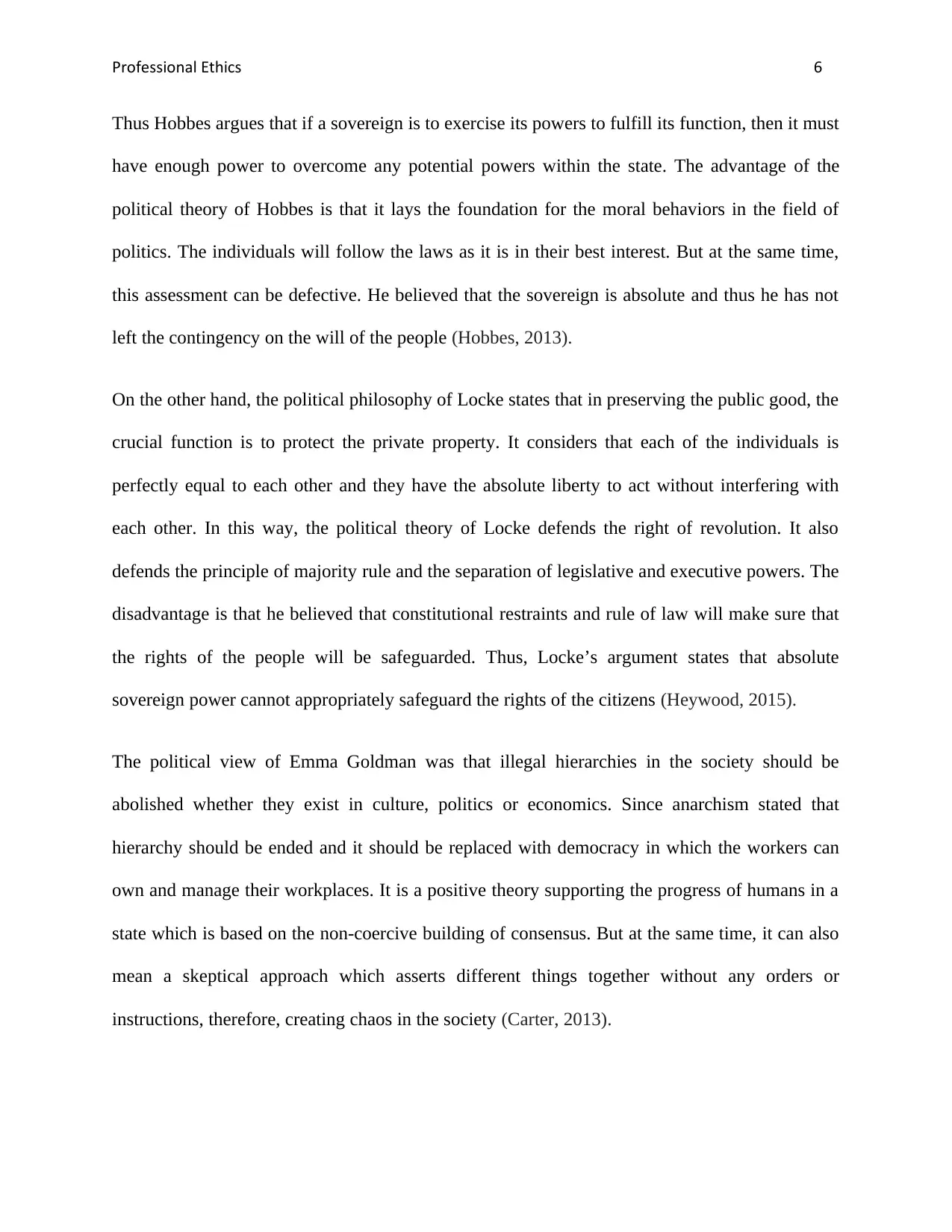
Professional Ethics 6
Thus Hobbes argues that if a sovereign is to exercise its powers to fulfill its function, then it must
have enough power to overcome any potential powers within the state. The advantage of the
political theory of Hobbes is that it lays the foundation for the moral behaviors in the field of
politics. The individuals will follow the laws as it is in their best interest. But at the same time,
this assessment can be defective. He believed that the sovereign is absolute and thus he has not
left the contingency on the will of the people (Hobbes, 2013).
On the other hand, the political philosophy of Locke states that in preserving the public good, the
crucial function is to protect the private property. It considers that each of the individuals is
perfectly equal to each other and they have the absolute liberty to act without interfering with
each other. In this way, the political theory of Locke defends the right of revolution. It also
defends the principle of majority rule and the separation of legislative and executive powers. The
disadvantage is that he believed that constitutional restraints and rule of law will make sure that
the rights of the people will be safeguarded. Thus, Locke’s argument states that absolute
sovereign power cannot appropriately safeguard the rights of the citizens (Heywood, 2015).
The political view of Emma Goldman was that illegal hierarchies in the society should be
abolished whether they exist in culture, politics or economics. Since anarchism stated that
hierarchy should be ended and it should be replaced with democracy in which the workers can
own and manage their workplaces. It is a positive theory supporting the progress of humans in a
state which is based on the non-coercive building of consensus. But at the same time, it can also
mean a skeptical approach which asserts different things together without any orders or
instructions, therefore, creating chaos in the society (Carter, 2013).
Thus Hobbes argues that if a sovereign is to exercise its powers to fulfill its function, then it must
have enough power to overcome any potential powers within the state. The advantage of the
political theory of Hobbes is that it lays the foundation for the moral behaviors in the field of
politics. The individuals will follow the laws as it is in their best interest. But at the same time,
this assessment can be defective. He believed that the sovereign is absolute and thus he has not
left the contingency on the will of the people (Hobbes, 2013).
On the other hand, the political philosophy of Locke states that in preserving the public good, the
crucial function is to protect the private property. It considers that each of the individuals is
perfectly equal to each other and they have the absolute liberty to act without interfering with
each other. In this way, the political theory of Locke defends the right of revolution. It also
defends the principle of majority rule and the separation of legislative and executive powers. The
disadvantage is that he believed that constitutional restraints and rule of law will make sure that
the rights of the people will be safeguarded. Thus, Locke’s argument states that absolute
sovereign power cannot appropriately safeguard the rights of the citizens (Heywood, 2015).
The political view of Emma Goldman was that illegal hierarchies in the society should be
abolished whether they exist in culture, politics or economics. Since anarchism stated that
hierarchy should be ended and it should be replaced with democracy in which the workers can
own and manage their workplaces. It is a positive theory supporting the progress of humans in a
state which is based on the non-coercive building of consensus. But at the same time, it can also
mean a skeptical approach which asserts different things together without any orders or
instructions, therefore, creating chaos in the society (Carter, 2013).
Paraphrase This Document
Need a fresh take? Get an instant paraphrase of this document with our AI Paraphraser
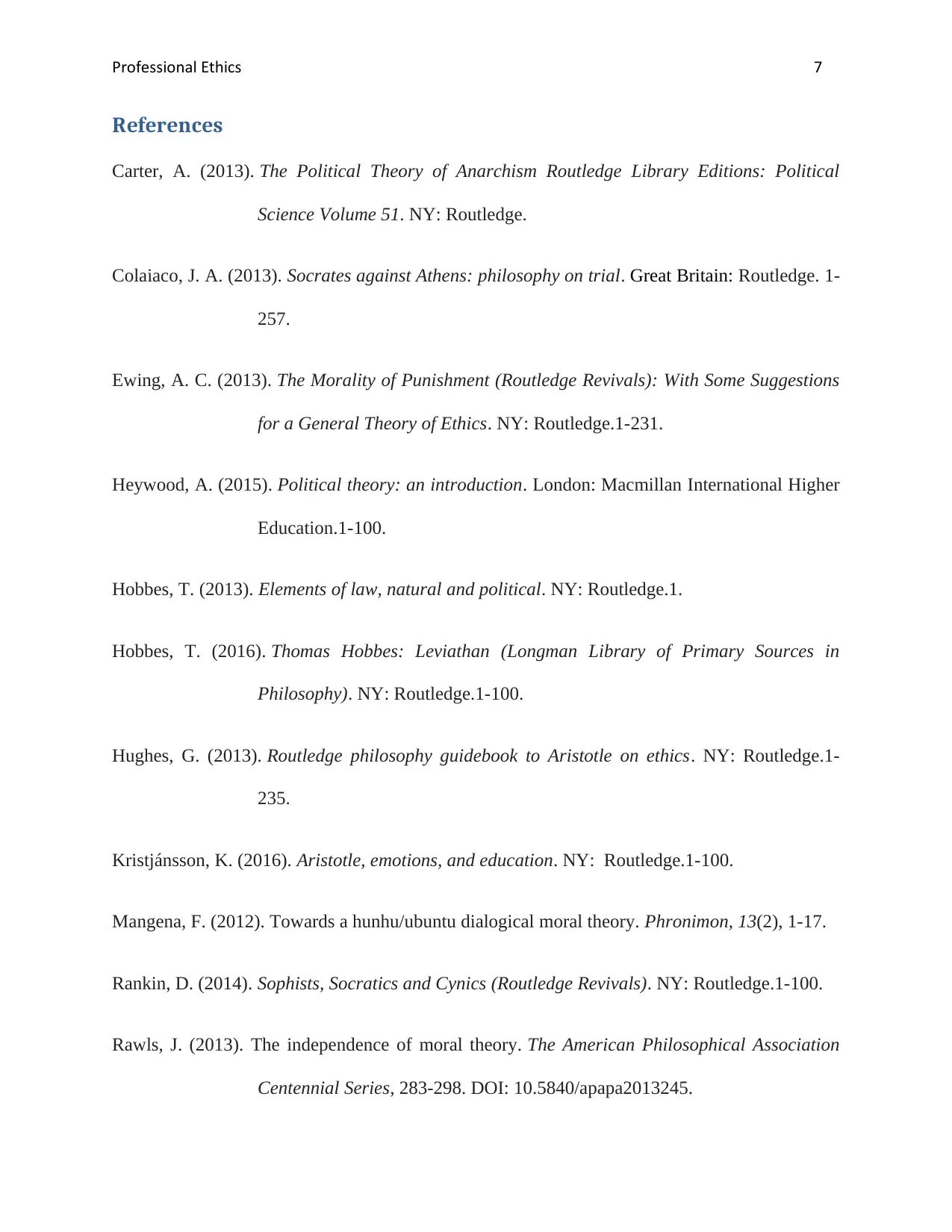
Professional Ethics 7
References
Carter, A. (2013). The Political Theory of Anarchism Routledge Library Editions: Political
Science Volume 51. NY: Routledge.
Colaiaco, J. A. (2013). Socrates against Athens: philosophy on trial. Great Britain: Routledge. 1-
257.
Ewing, A. C. (2013). The Morality of Punishment (Routledge Revivals): With Some Suggestions
for a General Theory of Ethics. NY: Routledge.1-231.
Heywood, A. (2015). Political theory: an introduction. London: Macmillan International Higher
Education.1-100.
Hobbes, T. (2013). Elements of law, natural and political. NY: Routledge.1.
Hobbes, T. (2016). Thomas Hobbes: Leviathan (Longman Library of Primary Sources in
Philosophy). NY: Routledge.1-100.
Hughes, G. (2013). Routledge philosophy guidebook to Aristotle on ethics. NY: Routledge.1-
235.
Kristjánsson, K. (2016). Aristotle, emotions, and education. NY: Routledge.1-100.
Mangena, F. (2012). Towards a hunhu/ubuntu dialogical moral theory. Phronimon, 13(2), 1-17.
Rankin, D. (2014). Sophists, Socratics and Cynics (Routledge Revivals). NY: Routledge.1-100.
Rawls, J. (2013). The independence of moral theory. The American Philosophical Association
Centennial Series, 283-298. DOI: 10.5840/apapa2013245.
References
Carter, A. (2013). The Political Theory of Anarchism Routledge Library Editions: Political
Science Volume 51. NY: Routledge.
Colaiaco, J. A. (2013). Socrates against Athens: philosophy on trial. Great Britain: Routledge. 1-
257.
Ewing, A. C. (2013). The Morality of Punishment (Routledge Revivals): With Some Suggestions
for a General Theory of Ethics. NY: Routledge.1-231.
Heywood, A. (2015). Political theory: an introduction. London: Macmillan International Higher
Education.1-100.
Hobbes, T. (2013). Elements of law, natural and political. NY: Routledge.1.
Hobbes, T. (2016). Thomas Hobbes: Leviathan (Longman Library of Primary Sources in
Philosophy). NY: Routledge.1-100.
Hughes, G. (2013). Routledge philosophy guidebook to Aristotle on ethics. NY: Routledge.1-
235.
Kristjánsson, K. (2016). Aristotle, emotions, and education. NY: Routledge.1-100.
Mangena, F. (2012). Towards a hunhu/ubuntu dialogical moral theory. Phronimon, 13(2), 1-17.
Rankin, D. (2014). Sophists, Socratics and Cynics (Routledge Revivals). NY: Routledge.1-100.
Rawls, J. (2013). The independence of moral theory. The American Philosophical Association
Centennial Series, 283-298. DOI: 10.5840/apapa2013245.
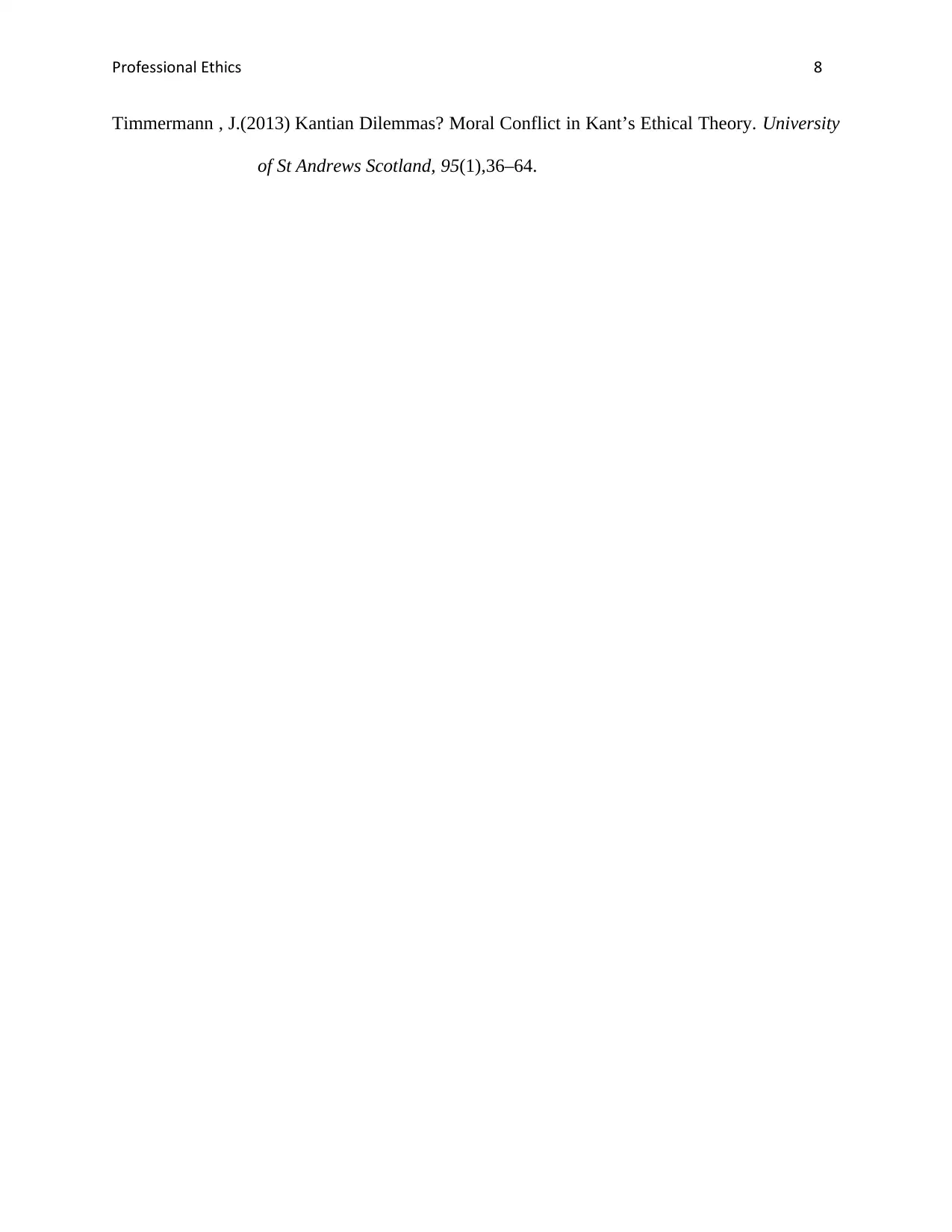
Professional Ethics 8
Timmermann , J.(2013) Kantian Dilemmas? Moral Conflict in Kant’s Ethical Theory. University
of St Andrews Scotland, 95(1),36–64.
Timmermann , J.(2013) Kantian Dilemmas? Moral Conflict in Kant’s Ethical Theory. University
of St Andrews Scotland, 95(1),36–64.
⊘ This is a preview!⊘
Do you want full access?
Subscribe today to unlock all pages.

Trusted by 1+ million students worldwide
1 out of 9
Your All-in-One AI-Powered Toolkit for Academic Success.
+13062052269
info@desklib.com
Available 24*7 on WhatsApp / Email
![[object Object]](/_next/static/media/star-bottom.7253800d.svg)
Unlock your academic potential
Copyright © 2020–2026 A2Z Services. All Rights Reserved. Developed and managed by ZUCOL.


